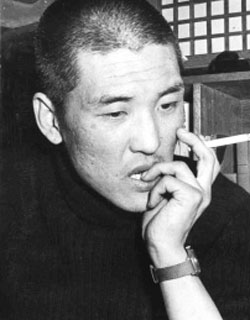More than a decade ago, octogenarian Jesuit felon Daniel Berrigan spoke at the local Jesuit university (in the auditorium of the business school, no less). During the Q & A, a friend of mine asked him this question, “Dan, what have you been reading these days?” His response: “The Gospels and the poets.”
This came back to my memory as I read a book from the late 80s, Berrigan’s Poetry, Drama, Prose, edited by Michael True. I took particular note of Berrigan’s engagement with three poets: Ezra Pound, Denise Levertov, and Kim Chi Ha. About Kim, the Korean Catholic, Berrigan observed, “In South Korea, a poet writes a few lines—and the junto leans forward, all ears. He is arrested, rigorously judged, condemned. How can this be? Why are speech and writing charged with political and religious lightning? Why must the poet’s mouth be bloodied, his teeth caved in?” Though Lawrence Ferlinghetti sees poetry as a subversive art, U.S. poets don’t end up beaten in maximum security prisons.
One of Berrigan’s criticisms of Pound was, “[He] thought art was a saving act. It was as simple as that. He was a Pelagic through and through.” Yet, the Jesuit acknowledges at least six of [Pound’s many works as] absolutely irreplaceable—The Unwobbling Pivot, Personae, Selected Poems, Guide to Kulcher, The Classic Anthology Defined by Confucius, The Women of Trachis.” It’s worth noting that Berrigan’s friend and later nemesis Ernesto Cardenal was greatly influenced by Pound’s poetics. How could Cardenal’s exteriorismo have emerged without the confrontation with Pound?
In a review of Denise Levertov’s prose works, Berrigan reported, “She tells of that comatose decade, the seventies, almost as though it hadn’t existed. She marches, keeps something alive, is personally dispassionate. There was work to be done, that was all. It little mattered that the work was despised or ignored or neglected. It was simply there, as evil was, as the world was; as hope was. She is passionate only about the issues, life or death.” At the beginning of the decade, Levertov made, like Berrigan did four years before her, the long trek to North Vietnam, and learned first-hand about Vietnamese resilience in the face of American savagery.
Only yesterday, a friend acknowledged how toxic the political climate and news are for her and her colleagues (working in the health field with endangered immigrants). She distances herself from some social media, tries to practice healthy detachment, for she knows, like many of us, an hour of reading bad news, however trenchant the critical analysis, only gets you so far. I sent her Thich Nhat Hanh’s poem, “The Good News,” as an encouraging reminder. And then there are Brecht’s lines, “In the dark times/ Will there be singing?/Yes, there will be singing/About the dark times.”
